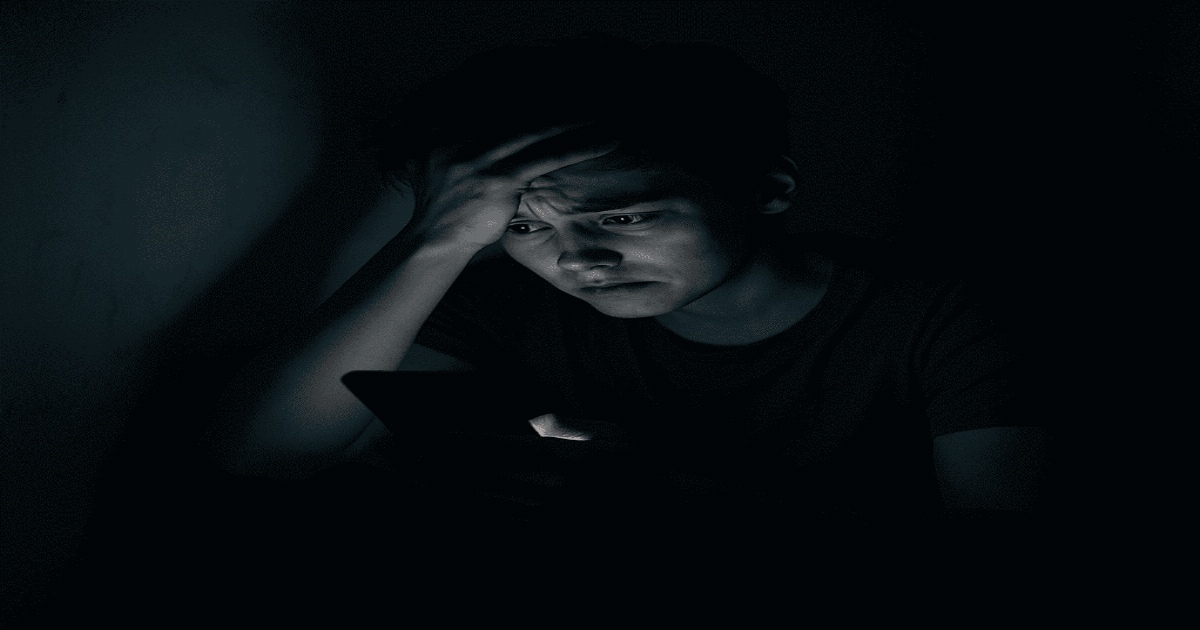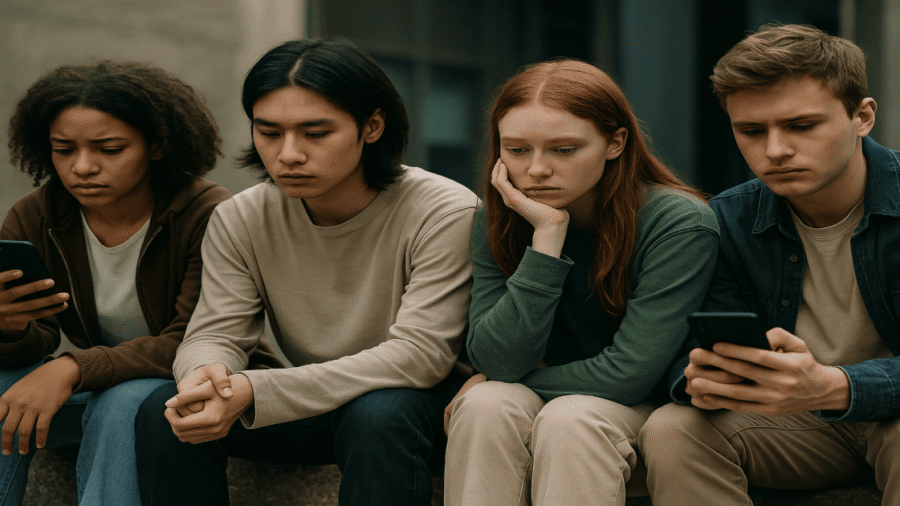Every generation has suffered their own kind of storm.
Our grandparents lived through war and worked hard to rebuild their lives. Our parents navigated changing times, rising technology, and shifting values. Millennials stepped into adulthood just as the world was changing fast balancing student loans, job uncertainty, and the rise of the internet. Yet for them growing up meant freedom, curiosity, and a slow emergence into oneself.
Then came the Generation Z’s, those born between 1997 and 2012.
For this generation, the journey into adulthood feels different. It is a period filled with silent stress, social media stress, pressure to succeed, and the overwhelming pace of a world that never really slows down.
News alerts, social media feeds, school demands, family expectations. All of this blends into a constant stream of noise. And underneath it all, so many are just trying to stay afloat. Yet they are expected to figure out who they are and yet stay connected to everything, all the time.
And in our current world that is allegedly more open when it comes to mental health, so many Gen Z’s are still isolated, unheard, or do not know how to seek help.
In this post, we will explore the most pressing mental health challenges the Generation Z’s are facing and more importantly, offer practical, supportive ways to address them.
The Mental Health Crisis Facing Gen Z’s
The Generation Z is reporting significantly higher levels of stress, anxiety, and depression compared to any previous generation. According to the American Psychological Association, more than 90% of Gen Z adults say they have experienced at least one physical or emotional symptom because of stress, including feeling depressed or lacking motivation. The Stress in America 2023 report highlights that the Gen Z’s are struggling with emotional exhaustion and a lack of confidence about the future (Source).
But why is this generation more affected?
Key Mental Health Challenges for Gen Z
1. Anxiety and Depression Are on the Rise
Many Gen Z teens and young adults are struggling with anxiety and depression, and they are going about it silently. Research shows that anxiety is showing up twice as often in Gen Z compared to older generations. In fact, it is four times more common than it was for Baby Boomers at the same age (Source)
Why? Because today’s youth are burdened with so much. They are expected to succeed in school, to land a job in a shaky economy, make their voices heard around the world, and to always look like they are doing fine and have it all together even when they are not. Social media adds to this, making it feel like everyone else has their life together.
In our article, The Rising Epidemic of Anxiety Disorders in Teens, we break down the warning signs of anxiety and how they often begin unnoticed. When Gen Z speaks of burnout, they are often referring to more than academic pressure, they are talking about life feeling overwhelming and emotionally unmanageable.
2. The Impact of Social Media and Screen Time
Scrolling endlessly through curated images and filtered perfection can leave anyone feeling less than enough. A recent report by the World Health Organization stated that the number of adolescents who display signs of problematic social media use jumped from 7% in 2018 to 11% as at 2022.
Most Gen Z’s are aware of this cycle and consciously try to escape it. However, screen addiction, especially related to short-form video content can interfere with sleep, attention span, and self-esteem.
Our post, The Silence Struggles of High‑Functioning Anxiety, talks about how one can seem to be doing well while silently suffering. Many of these same individuals are stuck in cycles of digital comparison and emotional suppression.

3. The Stigma That Still Surrounds Mental Health Even in Online Spaces
Gen Z’s are mostly described as the most open generation when it comes to talking about mental health. And it appears to be true with all the awareness and education going on. But it does not mean it is always easy for them to ask for help.
Even today, many young people still fear being judged if they open up. They don’t want to be called “too emotional” or “just attention-seeking.” This kind of mindset makes them feel like they have to figure it all out on their own, even when they are hurting.
According to the World Health Organization, mental health problems like depression, anxiety and behavioural disorders are among the major reasons teens and young adults are struggling worldwide.
The truth is no one should have to carry their pain in silence. Gen Z’s do not have to be “strong all the time” they need space to be human. What they truly need is permission to not be okay, to ask for help, and to heal at their own pace.
4.Isolation and Loneliness in a Hyperconnected World
This generation mostly crave for and have thousands of followers online yet feel lonely. That is the loneliness paradox. Even though they are more connected than ever online, many say they feel emotionally disconnected in real life.
The Annie E. Casey Foundation found that nearly half of Gen Z often feel anxious, and 1 out of every 5 constantly feel depressed, even with constant access to digital platforms.
This generation cares about real connection. But it is hard to find in a world that has so much filtering, instant responses, and superficial posts. This has resulted in a quiet kind of loneliness that does not always show but hurts deeply and stings like an open wound.
How to Support Gen Z’s Mental Health
1. Encourage Open Conversations and Normalise Therapy
Let us learn to normalise and make it okay to talk about feelings. Families, schools, and peer groups must also normalise therapy as a valid tool and not a last resort. Resources like How to Recognise Signs of Anxiety in Teens are excellent starting points for understanding what to look out for.
Encouraging Gen Z’s to open up and listen without judgment can go a long way.
2. Promote Digital Wellness
Helping them to change the way they use social media. Let us not blame them for being online because this is their time, but guide them to use it in healthier ways.
All these social media Apps especially Instagram and TikTok are designed to keep attention. And constant scrolling can quietly feed insecurity, anxiety, and burnout.
Hence we should rather help this generation set healthy boundaries like turning off notifications, taking time off certain apps, or following accounts that uplift rather than drain can make a real difference.
Sometimes the best support is not telling them to “log out” but showing them how to take care of their minds in a world that is always online.
3. Build Coping Skills for Everyday Stress
These are some real-life strategies for building emotional resilience:
- Practice daily mindfulness or breathing exercises
- Encourage journaling as a way to track emotions
- Recommend apps that focus on mental health, like Calm or Headspace
- Offer safe spaces for in-person social interaction
- Help them build sleep hygiene routines

4. Watch for the Warning Signs and Take Action
Sometimes, Gen Z will not say they are struggling but their behaviours will. Look for signs like:
- Withdrawal from friends or activities
- Sleep disruptions or excessive fatigue
- Sudden academic decline or missing deadlines
- Emotional outbursts or extreme irritability
- Persistent feelings of hopelessness
In our post, The Rising Epidemic of Anxiety Disorders in Teens, we discuss the long-term consequences of untreated anxiety. Early intervention truly saves lives.
Gen Z’s Pain Is Real but So Is Their Strength
Generation Z’s are not weak. They are not lazy. Neither are they too sensitive. They are emotionally intelligent, socially conscious, and courageous enough to face what many before them ignored.
Yes, they are struggling but they are also reaching out, speaking up, and breaking the silence. And with the right support, this generation can be the one that redefines how we come to understand and react to mental.
It starts with listening. It continues with compassion. And it ends with action.



Add a Comment